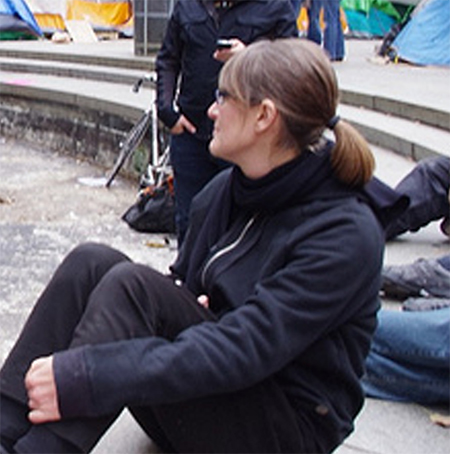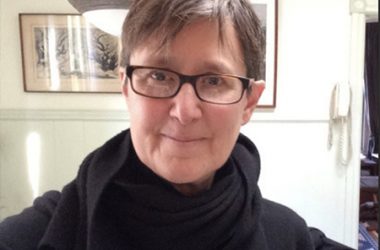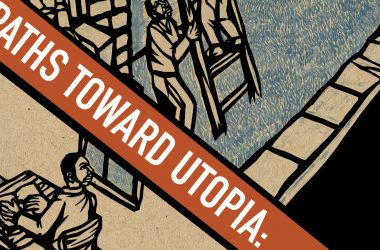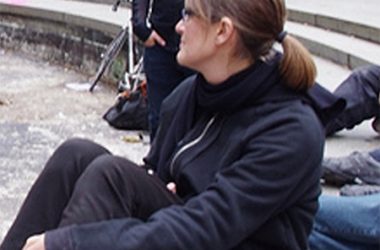
November 23, 2012
For those who know me, for those who’ve read my Anarchism and Its Aspirations, you’ll know that I’m fond of putting “self-” in front of a whole lot of words that, as a constellation, begin to constitute what seem the foundation of a free society. My favorites were long “self-governance” and “self-organization,” and I definitely tilted toward the structural side of things in terms of how I saw our forms of freedom unfolding.
Then some four or so years ago now, I and my longtime ex-partner — skeptical rationalist intellectuals that we both were — decided to start a lengthy process of figuring out whether or not we wanted to stay “in relationship” (an intriguing term, or way of thinking, that I discovered a year or so after we broke up, from the most insightful and magical of people I dated in the Bay Area). We had, from the start of being in relationship, agreed to honesty, communication, and dynamism, which included voluntary association — self-chosen love — and reevaluating that from time to time. When it felt like things really weren’t working, we took that process of voluntary disassociation and being good to each through it seriously (we were also both serious people), and turned to resources outside ourselves — friends but also a therapist, who ended up seeing both of us separately too (something she never did), since she observed, “You aren’t mad at each other; you’re both trying to do the best thing for each other and yourselves.” I remember the first visit with her, when she asked both of us to “feel.” We looked at each other, with one of those shared glances that people who know each other so well engage in, and both of us again described our feelings. “You two are too smart and too articulate for your own good,” our therapist laughed. “You can both intellectualize your feelings; but you’re not feeling them!”
What I discovered through the process of shifting, through hard work, those “feelings” from my mind to my body — and then putting the two in good relationship — among so many things she mentored me into self-discovering, was that I could and did learn to self-manage my self, my emotions, my internal life. Not to say I’m perfect at it, or always succeed. I feel, in fact, like I’m failing pretty miserably at it this week. But suddenly that little and yet huge “self-” of mine was nonstructural too. Therapy was a gift — of watching my “self” unfold so that I could better understand and have empathy for it, better self-manage it, and thus better become and keep becoming the person I want to be. (Emphasis on: work in process for whole of one’s life.) This lead to another unfolding: I really felt the necessity of why anarchism’s aspiration, writ large, had to be aimed toward free individuals for/in a free society — both need to be in a clear-eyed, processual relationship if we’ve any hope of social transformation.
Of late, I kept getting kind messages urging me to remember “self-care” — another use of “self-” that has more widely emerged within our milieus and movements within the past couple years. (A note here, in case it’s not self-evident: all these “selves-” are social, not some atomized, estranged, or egoistic being.)
All these many anarchic selves — from self-determination to self-discipline, from self-direction to self-governance, from self-management to self-care, etc. — are all, I fear, crying out for better commons within which to commune. Without that — without places and spaces, physical and otherwise, in which to experiment with these selves as we learn to use, share, and enjoy our world — my little “self-” is a sorry shadow of what it could be, hard as we all try. We’ve seen how hard that can be through our valiant experiments within, say, Occupy last year and now Occupy Sandy Relief. But it’s also the stuff of pointing us past this present, letting us begin to feel, really feel — deep within our minds and bodies — what that new world already could be, if only temporarily, fleetingly.
I’m a bundle of feelings these days, and my own ability to self-organize them is being unusually challenged. My therapist often used the word “curious.” She’d always ask me to stay present with a feeling or thought and be curious about it. To take a feeling, especially a difficult or painful one, set it on a chair next to me, and be curious about it, get to know it, understand its perspective and why it was there visiting me. Then self-manage it, incorporate it back into my self, in a way that felt self-chosen and balanced. Healthy. And so in the future, also, I will be able to recognize it when it first knocks at my door and deal with it in a friendly, homey way. It’s a silly thought experiment (says my rationalist self), but it’s worked for me many times.
And so this morning, I woke with one of those old feeling-friends hovering above me, pressing its hand on my chest, heavily. “Wake up! You forgot about me! I’m back to bother you!” It’s a feeling I don’t like, and one that I thought I’d thoroughly self-incorporated or better yet self-banished long ago. “Wake up! You’re all alone in this world, and I’m not going to let you forget it!” It’s the feeling that comes from my earliest biography and winds it way through my life. When I sat it down in the past for a good long chat with it, I realized that it has also served me well — rather than “alone,” I can find traits of strength, autonomy, independence of conviction, responsibility, etc., or perhaps best of all, the spirit of anarchism: self-authority. Seeing its good side was, in fact, what sent that feeling packing.
But feelings are like traveling anarchists: you’ll always see them again, just when you lest expect it, especially the ones you hoped you wouldn’t! It makes sense that old feelings are trotting after me as I’m facing a new, excruciating decision and trying to make it through a consensual, clear-eyed process so it will feel good for everyone (because as a good anarchist, I’m trying my damnest to use the tools I think I’ve learned), and having each process I devise fall apart until it feels — even if it isn’t wholly true — that I’m “alone in this world” again as final arbiter in my bio-family for a decision that no one wants to make — a role I was given, played, or accepted, or as bad combination of all those and more, for as long as I can remember.
I’ve been doing good “self-care” for weeks now, as my mom struggles through chemo side effects and my dad battles (like Don Quixote — a figure that pretty much describes everyone in my bio-family) a virus that has taken away most of who he is and was . . . or the self-care I think most of us mean: drink lots of fluids, try to eat vegetables, relax, exercise, sleep, and so on. Now we need to decide the impossible: put my dad in a “nursing home” an hour’s distance from my mom, in a town we have no relationship to, a town we don’t want to be in relationship with, or go the hospice route. As the days tick away on our deadline to decide — a deadline decided for us by the medical-industrial complex — all those notions of self-care seem hollow without that commons I mentioned above.
To some degree, yes, these self-care tricks work, like this afternoon when I took an invigorating “power walk” (as two teenage boys in my path playful noted to me when I walked by them) and simply noticed, simply was curious about, all the many visceral joys around me: boxes of free books (even if all were trashy and trashed), still-lingering pumpkins on Brooklyn stoops with now-droopy grins, and piles of shimmery-delicate yellow leaves to run my feet through, among other things. Life, joy, or the stuff of it anyway.
But it struck me how I — that is, how we — all need so much more when it comes to self-care. For one, as a friend is fond of astutely observing, communal self-care and caring shouldn’t be something special, reserved for the most awful events in our lives; it should be the fabric of our lives, through the sorrow and joys, through the whole spectrum of human feelings and experiences. In the absence of that, as I’m seeing, we are reduced to individualistic-care in times of individual crises. And as self-compassionate as that may be, it does indeed leave us feeling alone in this world, in the way that Marx talks about capitalism estranging us from a world of our own making, that then seems like a monster controlling us. They aren’t coequivalent; but they are, I fear, in relationship.
This become sharply clear to me today when I quietly — with deep curiosity afterward — took in two other, quite different kinds of self-care, within micro-commons where my use, sharing, and enjoyment is truly possible due to a multiplicity of ways that forms of collective self-freedom are linked to them. One was simply working on various projects alongside a friend, with music in the background and a whole lot less conversation than we usually engage in, within a collectively created space. A simple act, as simple as walking through autumn leaves and noticing the quiet beauty of it. The other was one of my sisters, also a close friend, really listening to me on the phone, really hearing that triggered “I’m alone” feeling, and calmly offering a simple, elegant “solution” to the process of making our impossible family decision. As comforting as a few pumpkins perched on a porch. In each case, my self-care became about social relations, embedded within self-forged social organization: better ways of doing political projects, friendships, family.
My morning “wake-up” friend seems to have grabbed its patch-covered backpack and moved on to another city — at least for now. After my power walk, quiet workday, and phone call with my sister, I responded to a call from the hospital where my dad is still housed, tethered by tubes to illness and a bed. Apparently he’d gotten agitated a few hours earlier, and his heart rate had gone up. A nurse got him to use his one good hand/arm in his near-immobilized body to indicate what he wanted, using his finger to point to letters on an alphabet card. A breathing tube and weakness keep him from speaking (and he was a really talker, which goes some way to explaining a part of me too — especially the public part most people see). He wanted my mom. He wanted her to be there, to be with him. She’d been there the day before, on Thanksgiving, on what was a good visit. I didn’t hear details of yesterday, but on her visit the day before Thanksgiving, she’d put her head on his tummy, and he’d patted her hair lovingly for an hour or so with his one good hand, in silence together. The nurse tried to call me early this evening, the bio-family “decision maker,” to get my mom there. I’m in Brooklyn; my mom’s only about four miles from my dad in Michigan (ah yes, family dynamics die hard; I’m listed as the one to call for medical stuff/decisions.) By the time I checked my cell phone and called the nurse back, they’d calmed my dad down, he was sleeping, and it was too late to call my mom, plus too late for her to get a ride to see him anyway; she gets dizzy from the chemo so often can’t drive herself.
A simple moment in a string of poignant moments in an awful now-thirteen-weeks of moments. I hung up from the nurse’s report, promising I’d call my mom first thing in the morning and urge her to figure out a ride quickly to see my dad. I turned on a song I’d been hearing in my head all day for some reason — The Weakerthans’ “Left and Leaving” — a good-bad choice, and cried. I’ve cried a lot the past couple days, more than I have in the near-thirteen-weeks now, as that “I’m alone” feeling came closer and closer to the surface, until it fully appeared this morning. Tonight, this last batch of tears felt oh so different: self-soothing ones, for the necessary sorrow that is good to feel, made OK because I’m not only back to being able to self-manage my emotions — to really feel them and be curious about them — but also able to do that within a newfound understanding of what self-care could and should be. A fabric of being in relationship with oneself, one’s emotions, and the ongoing caring community of others, through thin, thick, and joy.
I’ve no idea what decision my family will come to, soon, or how intentional or resolute it will be. Maybe it’ll be just as messy and beautiful as all those Occupy decisions and nondecisions. We are none of us really good at this process stuff yet, in a world where “self-” is far more frequently attached to “self-made man” than “self-organized society.” Yet it really does feel OK. Neither good nor bad, but fine, as in “we’ll get through this” — life, death, joy, sorrow, beginnings, and endings — yet with better selves that have further unfolded in the process. I can feel myself being “undone,” in the Judith Butler sense, where during those times when pieces of us necessarily fall apart and we become vulnerable, let ourselves be vulnerable, there’s a chance to remake ourselves through collective processes and thereby glimpse bits of a remade world too. Not cause-and-effect, but a curiosity to the unfoldings that take place when we keep ourselves open to the wholeness of all that life involves, from start to finish, and when we remain in relationship with everything that makes us human.
Maybe none of us will ever live to see a day when we truly achieve “a free society of free individuals,” but there are so many everyday ways we prefigure qualitative fragments of it, so many ways that we feel and practice it, as this sticker I ran across in Brooklyn a few weeks ago captures for me: “Alone In This, Together.” (That’s a good thing in my book, even if the book I’m currently reading got a little damp with tears tonight.)

* * *
I posted a few “word-photos” (my new genre) on my Facebook page, as homage to my dad and as a way to process some of my feelings through putting written words into the world. I figured I’d paste them here, below, as further fragments, perhaps, of prefigurative social-self-care.

November 17, 2012:
I’m trying so hard today to be ok. So hard. I’m trying not to think or stress or tear up; not to focus on that nagging feeling in the background of my body that I might actually be getting sick; and instead to get lost in reading, walking, and especially catching up on my paid copyediting work — distractions. But the book I just started to work on is about Jewish humor, and that makes it impossible not to think about my dad. Telling puns and jokes, especially ones making fun of his own (cultural) Judaism, has always been just about his favorite thing to do — to the point of driving me crazy at times. Each and every joke, which he frequently repeated multiple times over the years, always grew longer and more embellished, with the Jewish characters taking on increasingly detailed attributes and lengthier explanations before the punch line arrived. Now, of course, as he lies in a hospital bed with various life-support tubes, making it impossible to speak, I sorely miss his verbal wit, often backed up by his physical silliness, as in this photo I took of him over two years ago when my mom was then in a hospital, seriously ill.Here are two jokes that I know he’d like or might have even told me at some point — for him, with love, excerpted from the manuscript I’m (allegedly) concentrating on copyediting this (allegedly) restful Saturday:”Mrs. Markowitz was walking along the beach with her grandson when suddenly a wave came and washed the three-year-old boy out to sea.’Oh Lord!’ cried the woman. ‘If you’ll just bring that boy back alive I’ll do anything. I’ll be the best person, I’ll give to charity. I’ll go to temple. Please, God! Send him back!’At that moment, a wave washed the child back up on the sand, safe and sound. His grandmother looked at the boy and then up to the heavens.’Okay!’ she exclaimed. ‘So where’s his hat?’”AND
“A man
is hit by a car. A paramedic on the scene asks, ‘Are you comfortable?’
The Jew answers (in a Yiddish accent), ‘I make a living.’”* * *

November 18, 2012:
I’ve
been contemplating a lot lately about why tears but especially
laughter are the grease on the wheels of processing the existential
dilemmas of the human condition. I’ve been trying to practice it too,
particularly with laughter — although as this little face from a batch
of hundreds painted on a Lower East Side wall seems to express, sorrow
and smiles might form a bridge. And now, trying yet again to actually
succeed at being OK, to not get full-blown sick and rest, which also
means catching up on my paid copyediting, I found this illuminating
quote in the manuscript on Jewish humor that I’m working on —
illuminating for me, that is, as a godless anarcho-jew who can at the
moment barely handle thoughts of Gaza and thoughts of my super-ill dad
— clarifying the “chicken-soup” effect of humor on getting through
this life, which includes death, in as healthy, dignified, and loving
ways as we possibly can:”The benefits of Jewish humor are reaped
from the paradoxes of Jewish life, so that Jewish humor at its best
carries the scars of the convulsions that brought it into being.”
* * *

November 20, 2012:
How
I know that I’m definitely back home to NYC after a partial day away
to talk about “why I hate capitalism” in a college classroom, thereby
adding a few more reasons to the “I ♥ New York” list: I get to take a
beautifully brisk 30-block walk at midnight past the Flatiron building
(remembering how much better it looked during the hurricane blackout
than lit up by uber-pricey stores & wondering how we can achieve
that without capitalist-climate disasters), then through Union Square
(now filled with a “holiday village” that is probably supposed to
present a fully tolerant shopping experience but looks suspiciously like
a “Santa’s village”), then dodging a healthy-looking rat no worse for
the wear of the subways getting flooded, and finally finding a magic
wand sparkling on the ground, seemingly waiting just for me. I could use
a magic wand right about now to whisk away all the stress and grief
I’m laboring under — to end everything from capitalism and states,
with all the suffering they perpetuate, to my dad’s debilitating
illness, with the suffering it’s causing him and my family. I know it’s
not that simple, not that easy, but at very least, NYC occasionally
affords the delusionary glittery-gloss of being able to pretend, just
for a second. I love that second, even if I always hate capitalism.
Then the second passes, and “all that’s solid melts into air,” the rat
actually runs over the toe of my shoe, and my cheap, useless consumer
good of a magic wand goes dim and then dark.
* * *

November 22, 2012:
I
process through words, verbal but especially written. My friends and
chosen family (including some of the bio ones) are the recipients of my
verbal processing. But my wordsmithing feels like a public act, and
that it has to be public. All words are political, whether acknowledged
as such or not, and so I’d argue that language can & should be
utilized in our struggles for freedom as weapons, tools, aid &
mutual aid, inspiration, and intervention.George Caffentzis noted
nearly a year ago, at a verbal processing of loss and death among a
community of friends, that capitalism privatizes everything, including
death. I’m not sure whether he said this or not, but that means
capitalism steals everything from us, or tries to, including our
emotions and ability to process, and particularly in public, communal,
transparent ways.So here I go again, putting words out into what I
probably shouldn’t honor with the word “public,” since they are on
Facebook. Or rather, word-pictures. And on this day when I wanted to
simply forget for a bit — and in a few minutes, I’m off to try to do
just that with dear friends over good food, conversation, and drink
(with thoughts of other dear friends in my heart). Because one can, as
I’m finding, both forget and remember at the same time, and remember to
savor the joy of every day even as one stays present with an
anarchistic “one-day-at-a-time” way of working through hard decisions,
which too have glimpses of unexpected joy, despite the grief.As my dear
West Coast friend/family Harjit Singh Gill knows too well, I’m not a
big fan of traditional, homogeneous, non-self-chosen holidays. But one
of the few holidays my bio-family always celebrated, along with my
cousins and lots of friends, was Thanksgiving, with food, games,
mayhem, overlapping conversations, and many many jokes. Everything in
my family’s home when I was growing up was childlike mayhem, so it’s
hard to take seriously that it was “Thanksgiving” per se as much as an
excuse for just adding more people to the quirky mix.Every person and
every cousin in my family is doing something different this year, in
small groups. I just spoke with my mom, who had a small Tday “brunch”
with her best friend at an assisted living place she moved into three
months ago, yet her pleasure, love, and happiness couldn’t be quelled
when I talked to her. I learned how to always find joy from her. And
from my dad, who is still immobile in a hospital some 13 weeks after
getting West Nile Encephalitis from a little mosquito (thanks to shifts
in the climate, thanks to capitalism). My mom was about to go visit
him, and I know both of them (her energetic, and him much quieter) will
find joy with each other nonetheless. I fear my dad isn’t going to get
better. I hope he is able to die well, just as he lived well — lived
with humor, generosity, giving, and joy. Merriment, always.So here’s
another photo of more NYC street art that today made me think of my
dad, who was the main culprit for joking our way through long
Thanksgiving days throughout my childhood, along with this
eighteenth-century saying attributed (with some folk tinkering added
in) to a Hasidic master from western Ukraine; my dad’s family came from
somewhere nearby, though all of them were non- or irreligious Jews!:
“There is nothing as whole as a broken Jewish heart.” ♥
* * *
If you’ve run across this blog post as a reposting somewhere, you can find other blog-musings and more polished essays at Outside the Circle, cbmilstein.wordpress.com/. Share, enjoy, and repost–as long as it’s free, as in “free beer” and “freedom.
(Photos by Cindy Milstein)




